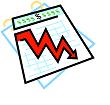 I discussed briefly in my last monthly portfolio update that I'm looking to capture some tax loss in the remainder of the year so I can lower my tax for 2007. In theory it is simple: since I untimely loaded some financial stocks in October before they took a nosedive, if I sell these stocks by December 31st, I can realize some short-term capital loss. Short-term capital loss can be used to offset other short-term capital gains, which are usually taxed at one's tax bracket. For me, that's a hefty 28%.
I discussed briefly in my last monthly portfolio update that I'm looking to capture some tax loss in the remainder of the year so I can lower my tax for 2007. In theory it is simple: since I untimely loaded some financial stocks in October before they took a nosedive, if I sell these stocks by December 31st, I can realize some short-term capital loss. Short-term capital loss can be used to offset other short-term capital gains, which are usually taxed at one's tax bracket. For me, that's a hefty 28%.
But there are other things to consider before biting the bullet:
First, there is the wash sale rule. In short, if you buy the same stock within 30 days before or after your sale, you cannot claim the loss. So, the question becomes: what if your stock has a comeback just after your sale but before you can replace your shares after 30 days?
The law says wash sale rule applies when you trade with "substantially identical securities." For example, you cannot sell an index fund that tracks S&P 500 with another fund that tracks the exact same index. Therefore, to legitimately avoid wash sale without losing the potential comeback, one has to find what I called "reasonably" identical securities. This may mean:
- An actively managed mutual fund in exchange for an index fund
- A company that closely resembles the company you are selling (maybe in the same industry and experiencing the same issues)
Second, when it comes to realizing short-term capital loss, one does not always get tax benefit at the marginal tax rate. This can happen if one does not have short-term capital gain to offset the realized short-term capital loss, but has plenty of long-term capital gain on the book. In that case, since the long-term capital gain is otherwise taxed at a reduced capital gains rate (15% for those at tax brackets of 25% or higher, and 5% for those below), the real tax benefit of reaping year-end short-term capital loss is only produced at the much lower long-term capital gain tax rate.
So what did I decide to do with my investment loss on the table? First, I validated that I have realized about $5,000 in short-term capital gain this year. Second, I sold some of my Citigroup (C) shares to produce similar-sized capital loss, and reinvested the proceeds immediately with JP Morgan (JPM) and an ETF that tracks banking industry (KBE).
You may call it wishful thinking to still be exposed in the financials, or I can call myself following Warren Buffett's wisdom "to be fearful when others are greedy and to be greedy when others are fearful." Hopefully, if something good happens to the banking industry, it will lift all boats.
